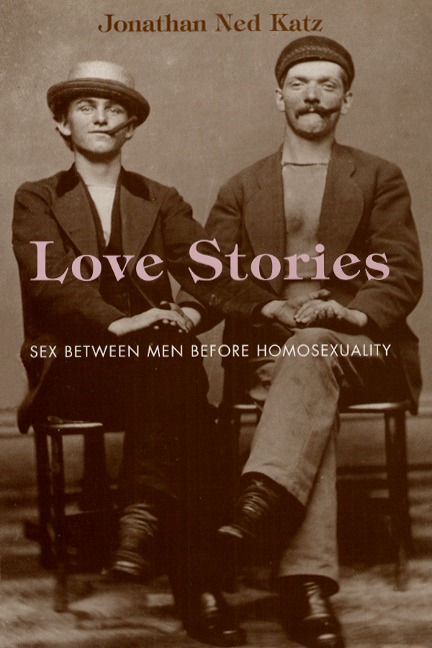In honor of LGBTQ+ History Month this October, we’re highlighting Jonathan Ned Katz’s 2001 book, Love Stories: Sex Between Men Before Homosexuality.
As the focus of this book is on sexuality and includes instances of homophobic along with racist language, it is intended for those 18 years of age and older. It is critical to note that Katz’s writing style, while informative, could be a challenge for a lay reader who doesn’t have a background in reading historical texts.
By compiling a handful of letters, interviews, narratives, articles, photographs, and court cases, the author traces the history of men’s intimate relationships with one another in the 19th century in the United Sates and the United Kingdom. These love stories range from the attraction between Abraham Lincoln and Joshua Speed to those featuring everyday indviduals. Katz makes known that during this point in time the concept of homosexuality did not exist as it does today. Instead, there were the notions of physical and spiritual love with the former regarded as strictly between a man and a woman. Without the language to accurately express their feelings, men-loving men were anxious about how to describe their attachments to each other.
It was not until famed transcendental writer Walt Whitman published his first edition of Leaves of Grass in 1855 and subsequent editions in the years to follow that men-loving men were able to identity with the homoerotic imagery in Whitman’s works. Katz details how Whitman’s role as a volunteer nurse during the Civil War as well as his numerous relationships with men influenced his subject matter. One of these most notable relationships was with John Addington Symonds who would go on to research and vigorously defend men who have sex with men. Although Katz documents and analyzes a great deal of Whitman’s writings and correspondence with men, he departs from his discussion of Whitman into talking about early forms of camp language, the formation of the gay bar, and an even the first makings of what would now be considered a queer organization. Katz’s research acts as a reminder that LGBTQ+ people have always been here, and to keep them in mind as the community continues to make strides for equality. Undoubtedly, gay men and those questioning their sexualities will be able empathize with the struggles of those who came before them. But at the same time, they can take solace in the affectionate messages shared between companions.
If you’re questioning your identity, have questions or concerns on coming out, or are in need of local LGBTQ+ resources, please contact the National LGBT Help Center through the support services listed below.
Lesbian, Gay, Bisexual, and Transgender (LGBT) National Hotline: 1-888-843-4564
LGBT National Coming Out Support Hotline: 1-888-688-5428 (1-888-OUT-LGBT)
LGBT National Youth Talkline: 1-800-246-7743 (1-800-246-PRIDE)
LGBT National Senior Hotline: 1-888-234-7243
You can also reach out online at www.LGBThotline.org/chat

